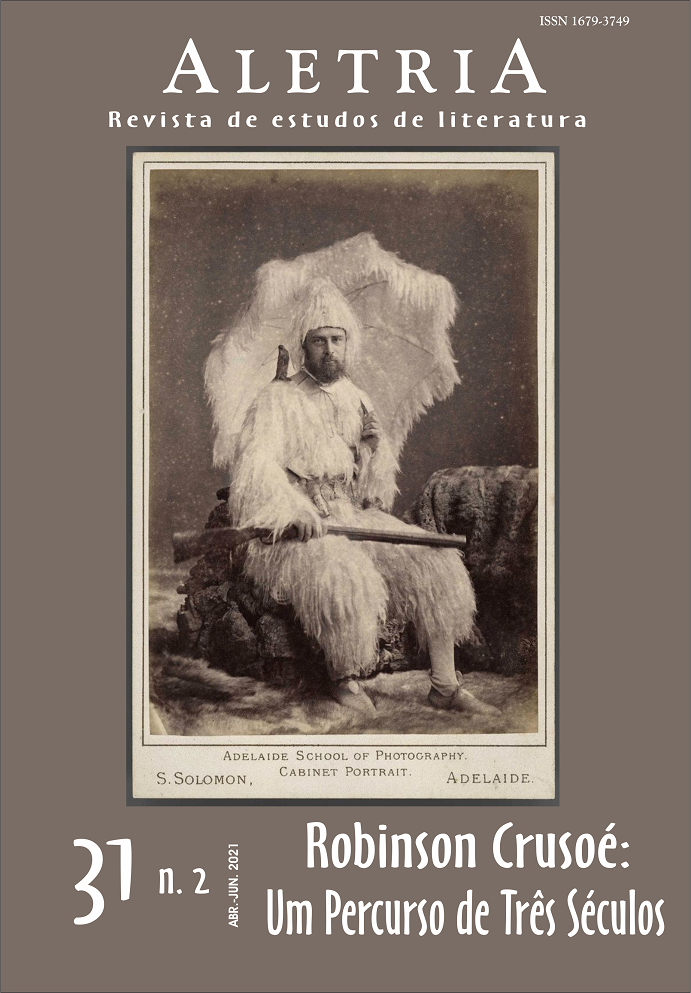Approaching Robinsons' discursive school
DOI:
https://doi.org/10.35699/2317-2096.2021.26029Keywords:
Daniel Defoe, Robinson Crusoe, robinsonade, narrative theoryAbstract
This essay aims to characterize a discursive school founded by Daniel Defoe with the publication of Robinson Crusoe three hundred years ago. The hypothesis that Robinson Crusoe inaugurates an important tradition for the development of the novel as a genre is supported through the observation of its formal economy and its presumed reading responses, which change over time, as shown by comparisons of different narratives that restore somehow the original model of Defoe in new contexts, such as The Swiss Family Robinson (Johann David Wyss), Godfrey Morgan (Jules Verne), Suzanne and the Pacific (Jean Giraudoux), Friday or the other Island (Michel Tournier), The Sexual Life of Robinson Crusoe (Michel Gall), and The Invention of Morel (Adolfo Bioy Casares). The dissimilarity between these titles contributes to the understanding of the continuities at stake as well as to outlining the distinctiveness of Defoe’s fiction in perspective.
Downloads
References
BONOMO, Daniel. Experimentum in insula: Robinson Crusoé nas origens do aborrecimento. Literatura e Sociedade, São Paulo, v. 22, n. 25, p. 117-131, jul./dez. 2017. DOI: https://doi.org/10.11606/issn.2237-1184.v0i25p117-131.
BORGES, Jorge Luis. Prólogo. In: CASARES, Adolfo Bioy. A invenção de Morel. Tradução de Sérgio Molina. 4. ed. São Paulo: Biblioteca Azul, 2016. p. 7-10.
BROCH, Hermann. Das Böse im Wertsystem der Kunst. In: BROCH, Hermann. Schriften zur Literatur 2. Frankfurt am Main: Suhrkamp, 1975. p. 119-156.
CASARES, Adolfo Bioy. A invenção de Morel. Tradução de Sérgio Molina. 4. ed. São Paulo: Biblioteca Azul, 2016.
CUNHA, Gualter. Uma dupla direção da escrita em Daniel Defoe: The Farther Adventures of Robinson Crusoe, ou, alguns bons ensinamentos da má literatura. Revista da Faculdade de Letras do Porto, Porto, v. 6, p. 189-206, 1989. (Série de Línguas e Literaturas, II).
DEFOE, Daniel. As novas aventuras de Robinson Crusoe. Tradução de Virgílio Tenreiro Viseu. Torres Vedras: E-Primatur, 2017.
DEFOE, Daniel. Robinson Crusoe. Edição de Michael Shinagel. 2. ed. New York: Norton, 1994. (Norton Critical Edition).
DEFOE, Daniel. Robinson Crusoé. Tradução de Sergio Flaksman. São Paulo: Penguin Classics Companhia das Letras, 2011.
FOUCAULT, Michel. O que é um autor? In: FOUCAULT, Michel. Estética: literatura e pintura, música e cinema. Organização de Manoel Barros da Motta. Tradução de Inês Autran Dourado Barbosa. 2. ed. Rio de Janeiro: Forense Universitária, 2006. p. 264-298. (Ditos e Escritos, 3).
FOUCAULT, Michel. Por trás da fábula. In: FOUCAULT, Michel et al. Júlio Verne: uma literatura revolucionária. São Paulo: Documentos, 1969. p. 11-19.
GALL, Michel. A vida sexual de Robinson Crusoé. Tradução de Mirian Paglia Costa. 2. ed. São Paulo: Brasiliense, 1987.
GIRAUDOUX, Jean. Suzana e o Pacífico. Tradução de Nair Lacerda. São Paulo: Difusão Europeia do Livro, 1958.
HUNTER, J. Paul. Genre, nature, Robinson Crusoe. In: RICHETTI, John (ed.). The Cambridge Companion to “Robinson Crusoe”. Cambridge: Cambridge University Press, 2018. p. 3-15. DOI: https://doi.org/10.1017/9781107338586.002.
JOYCE, James. Daniel Defoe. In: DEFOE, Daniel. Robinson Crusoe. Edição de Michael Shinagel. 2. ed. New York: Norton, 1994. p. 320-323. (Norton Critical Edition).
MAHER, Susan Naramore. Recasting Crusoe: Frederick Marryat, R. M. Ballantyne and the Nineteenth-Century Robinsonade. Children’s Literature Association Quarterly, [S.l.], v. 13, n. 4, p. 169-175, 1988. DOI: https://doi.org/10.1353/chq.0.0620. Disponível em: https://muse.jhu.edu/article/248614. Acesso em: 15 out. 2020.
MILLER, J. Hillis. Reading. The Swiss Family Robinson as Virtual Reality. In: LESNIK-OBERSTEIN, Karín. Children’s literature. New approaches. New York: Palgrave Macmillan, 2004. p. 78-92. DOI: https://doi.org/10.1057/9780230523777_4.
NODIER, Charles. Introdução. In: WYSS R. [sic]. O Robinson suíço. Tradução de Rosa de Murillo. Paris: Rio de Janeiro: Livraria Garnier Irmãos, [18--?]. p. i-viii. 2 v.
ROSA, Hartmut. Beschleunigung. Die Veränderung der Zeitstrukturen in der Moderne. 2. ed. Frankfurt am Main: Suhrkamp, 2016.
SAVIN, Tristan. Les enfants du capitaine Verne. L’Express, Paris, 1 fev. 2005. Actualité, Culture, Livres. Disponível em: https://www.lexpress.fr/culture/livre/les-enfants-du-capitaine-verne_809817.html. Acesso em: 15 out. 2020.
SEELYE, John. Introduction: The Swiss Family Robinson. Children’s Literature Association Quarterly, 1990 Proceedings, p. 4-12, 1990. DOI: https://doi.org/10.1353/chq.1990.0003. Disponível em: https://muse.jhu.edu/article/457521. Acesso em: 15 out. 2020.
TOURNIER, Michel. Sexta-Feira ou os limbos do Pacífico. Tradução de Fernanda Botelho. 3. ed. Rio de Janeiro: Bertrand Brasil, 2001.
VASCONCELOS, Sandra Guardini. A formação do romance inglês: ensaios teóricos. São Paulo: Aderaldo & Rothschild: Fapesp, 2007.
VERNE, Júlio. A escola dos Robinsons. Tradução de Assis de Carvalho. Lisboa: Livrarias Aillaud & Bertrand; Rio de Janeiro: Livraria Franciso Alves, [18--?]. (Grande Edição Popular das Viagens Maravilhosas aos Mundos Conhecidos e Desconhecidos).
WYSS, R. [sic]. O Robinson suíço. Tradução de Rosa de Murillo. Paris: Rio de Janeiro: Livraria Garnier Irmãos, [18--?]. 2 v.
Downloads
Published
How to Cite
Issue
Section
License
Copyright (c) 2021 Daniel Bonomo (Autor)

This work is licensed under a Creative Commons Attribution 4.0 International License.
Authors who publish with this journal agree to the following terms:Authors retain copyright and grant the journal right of first publication with the work simultaneously licensed under a Creative Commons Attribution Non-Commercial No Derivatives License that allows others to share the work with an acknowledgement of the work's authorship and initial publication in this journal.Authors are able to enter into separate, additional contractual arrangements for the non-exclusive distribution of the journal's published version of the work (e.g., post it to an institutional repository or publish it in a book), with an acknowledgement of its initial publication in this journal.Authors are permitted and encouraged to post their work online (e.g., in institutional repositories or on their website) prior to and during the submission process, as it can lead to productive exchanges, as well as earlier and greater citation of published work (See The Effect of Open Access).





